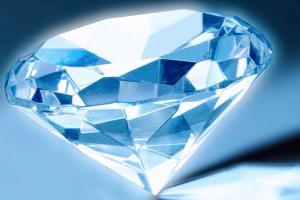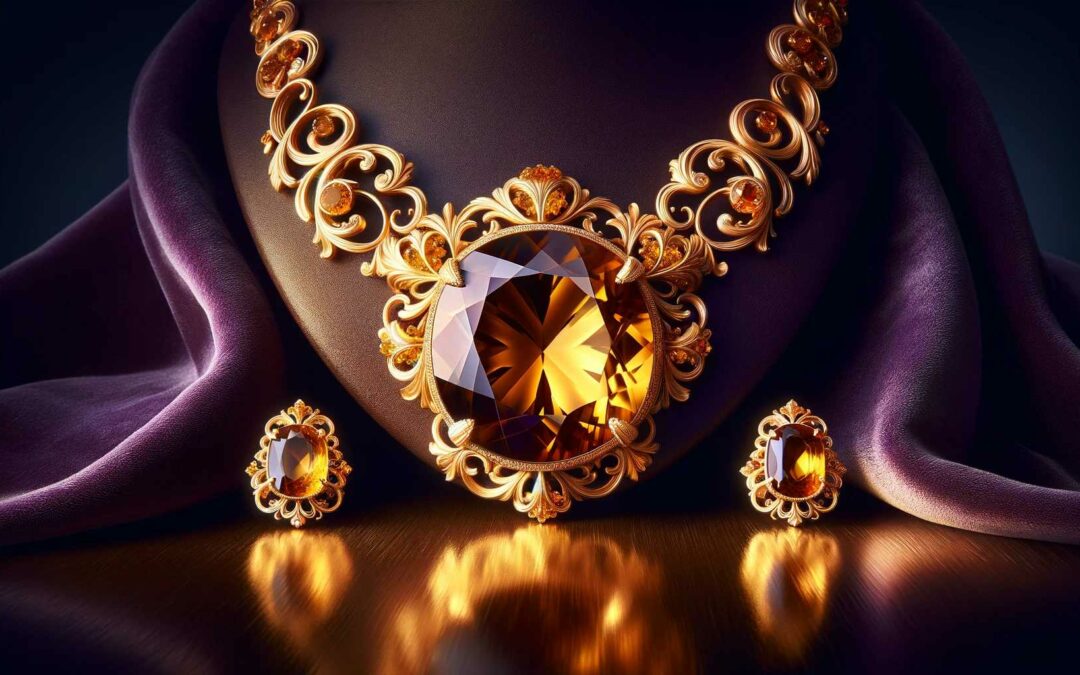Article Contents
Explore the allure and significance of citrine, a gemstone renowned for its vibrant color and exceptional clarity.
As November’s birthstone, citrine encompasses a spectrum of hues, from pale buttery yellow to deep honey.
Despite its growing rarity, citrine remains an exceptional value, offering a range of colors and brilliance.
This article delves into citrine’s characteristics, historical and contemporary significance, sourcing, and pricing dynamics, providing valuable insights into its evolving market position as a highly sought-after gemstone.
Key Takeaways
- Citrine is November’s birthstone and comes in various forms such as amethyst, rose quartz, smoky quartz, and rock crystal.
- It is considered one of the best gemstone values for the dollar and ranges in color from pale buttery yellow to dark honey.
- Citrine is often sold erroneously as topaz, but it is actually a type of quartz and is one of the least expensive gemstones.
- The scarcity of quality amethyst and citrine, along with high demand, has driven up prices for citrine in recent years.
Citrine Characteristics
Discussing the characteristics of citrine involves examining its color, clarity, and availability in the gemstone market.
Citrine, a variety of quartz, is known for its warm, sunny hue ranging from pale buttery yellow to dark honey. It is often associated with positivity, joy, and success, making it a popular choice for jewelry with symbolic significance.
Beyond its aesthetic appeal, citrine is believed to possess healing properties, including the ability to promote energy, creativity, and clarity of mind.
The increasing scarcity of high-quality specimens, particularly those with good clarity and rich color, has had an impact on citrine’s availability in the gemstone market. Despite this, citrine remains a valuable and relatively affordable option, offering a compelling combination of beauty, symbolism, and purported healing benefits.
Citrine as a Valuable Gemstone
Citrine, the variety of quartz known for its warm, sunny hue, continues to be recognized as a valuable gemstone in the market due to its rarity and symbolic significance.
The gemstone’s healing properties and symbolism add to its allure, making it a sought-after choice for jewelry and personal adornment. Some of the key factors contributing to citrine’s value include:
- Healing Properties: Citrine is believed to promote positivity, joy, and abundance, making it a popular choice for individuals seeking emotional and spiritual well-being.
- Symbolism and Meanings: Often associated with success, prosperity, and energy, citrine holds deep symbolic significance for those who wear it.
- Rarity: Quality citrine with good clarity and rich color is becoming increasingly rare, driving up its market value.
- Market Demand: Despite its increasing prices, citrine remains a coveted gemstone due to its scarcity and high demand.
- Jewelry Industry: Citrine’s versatility and symbolic significance have solidified its place as a valuable and meaningful gemstone in the jewelry industry.
Citrine in Jewelry Designs
The versatility and symbolic significance of citrine have led to its incorporation in various jewelry designs, catering to a wide range of aesthetic preferences and personal styles. Citrine’s unique properties, such as its wide range of colors from pale buttery yellow to dark honey, make it a popular choice for jewelry designers.
Its affordability and availability have also contributed to its widespread use in contemporary designs. Jewelry pieces featuring citrine include abstracted palm tree designs with 18K gold and diamond leaves, pendants with faceted designs, and gold rings with marquise-shape citrine.
The involvement of contemporary design and goldsmiths further emphasizes citrine’s versatility in the jewelry industry, making it a valuable gemstone option for those seeking freedom of expression.
Citrine’s Rarity and Price
Increased demand and a lack of high-quality specimens have an impact on rarity and price fluctuations in the citrine market. Despite being one of the least expensive gemstones historically, the rising demand and diminishing supply of high-quality citrine have led to price increases. This has also enhanced citrine’s investment potential, making it a valuable option in the gemstone market.
Moreover, citrine’s role in sustainable jewelry is gaining prominence due to its widespread availability and affordability, which allows for the creation of eco-friendly jewelry pieces. Its versatility in contemporary designs and its unique color variations make it an attractive choice for both traditional and modern jewelry, further solidifying its position in the market. Additionally, citrine is also a popular choice for those looking to follow sustainable and ethical practices in the jewelry industry. Its durability and ability to withstand everyday wear make it an ideal choice for everyday jewelry pieces, as highlighted in the Aldo Cipullo jewelry guide. This further cements citrine’s place as a versatile and environmentally friendly option for those seeking beautiful and sustainable jewelry.
Citrine’s Popularity in the Jewelry Industry
With its widespread availability and affordability, citrine has gained popularity in the jewelry industry for its versatility and rich color variations.
Citrine’s historical significance dates back to ancient civilizations, where it was believed to carry the power of the sun, bringing warmth, energy, and life to those who wore it.
In the jewelry industry, citrine’s symbolism as the November birthstone adds to its allure, making it a meaningful and personal choice for many. In addition to its warm, golden hues, citrine is often associated with prosperity and positive energy, further enhancing its appeal among gemstone enthusiasts. When compared to vintage turquoise birthstone insights, which often highlight themes of protection and healing, citrine stands out as a stone of abundance and joy. Its enduring popularity reflects not only its beauty but also the deep emotional and symbolic connections people associate with it.
The gemstone’s warm, golden hues also make it a perfect complement to various metal settings, allowing for stunning and diverse jewelry designs.
Its use in both traditional and contemporary jewelry styles further showcases its adaptability, cementing its place as a valuable and beloved gemstone option in the market. Citrine was particularly popular in the 1940s in the bold gold of the era, and it has continued to be a favored choice for jewelry enthusiasts. Its warm, sunny color is not only beautiful but also carries symbolic meanings of success, prosperity, and joy. Citrine’s popularity in jewelry has been further solidified by its use in iconic designs, such as the Aldo Cipullo jewelry history. Cipullo, known for blending luxury and irreverence, utilized citrine in his designs, adding to the gemstone’s allure and appeal in the market.
Citrine’s Quality and Availability
Due to its widespread availability and increasing scarcity of quality specimens, citrine’s quality and availability have become significant considerations in the gemstone market.
The market value of citrine is on the rise due to the decreasing availability of high-quality specimens. Citrine’s impact on fashion trends is noteworthy, with its versatility in contemporary jewelry designs and its use in cocktail jewelry during periods of scarcity for other precious gemstones.
The scarcity of quality citrine has led to an increase in prices, despite it being considered one of the best gemstone values for the dollar. Brazil remains the main source of citrine, and its formation in crystal-lined pockets called geodes contributes to its rarity.
This presents citrine as a valuable gemstone option in the market.
Citrine Sourcing and Formation
The sourcing and formation of citrine, primarily sourced from Brazil and often found in crystal-lined pockets called geodes, have a significant impact on its availability and market value.
Citrine is typically obtained through various methods such as mining and extraction from geodes.
The formation of citrine crystals is a result of the heating of amethyst, which causes its color to change from purple to yellow or orange. This process can occur naturally within the Earth or through artificial means.
Understanding the geological conditions and processes that lead to the formation of citrine is crucial in predicting its presence in specific regions and assessing its market value.
Additionally, the sourcing methods employed can affect the quantity and quality of citrine available for use in jewelry and other applications.
Citrine’s Impact on the Market
Citrine’s increasing scarcity and growing demand have significantly impacted its market value, leading to a notable rise in prices. This has resulted in a shift in the market dynamics and jewelry trends.
- Increased market value due to scarcity and demand
- Growing popularity of citrine in contemporary jewelry designs
- Rising prices making citrine a more valuable gemstone option
- Citrine’s impact on the perception of gemstone value and pricing
- Influence on consumer preferences for jewelry options
Citrine’s rarity and high demand have positioned it as a significant player in the gemstone market, influencing both consumer choices and jewelry trends. This has led to a reevaluation of the gemstone’s value and its role in the jewelry industry.

